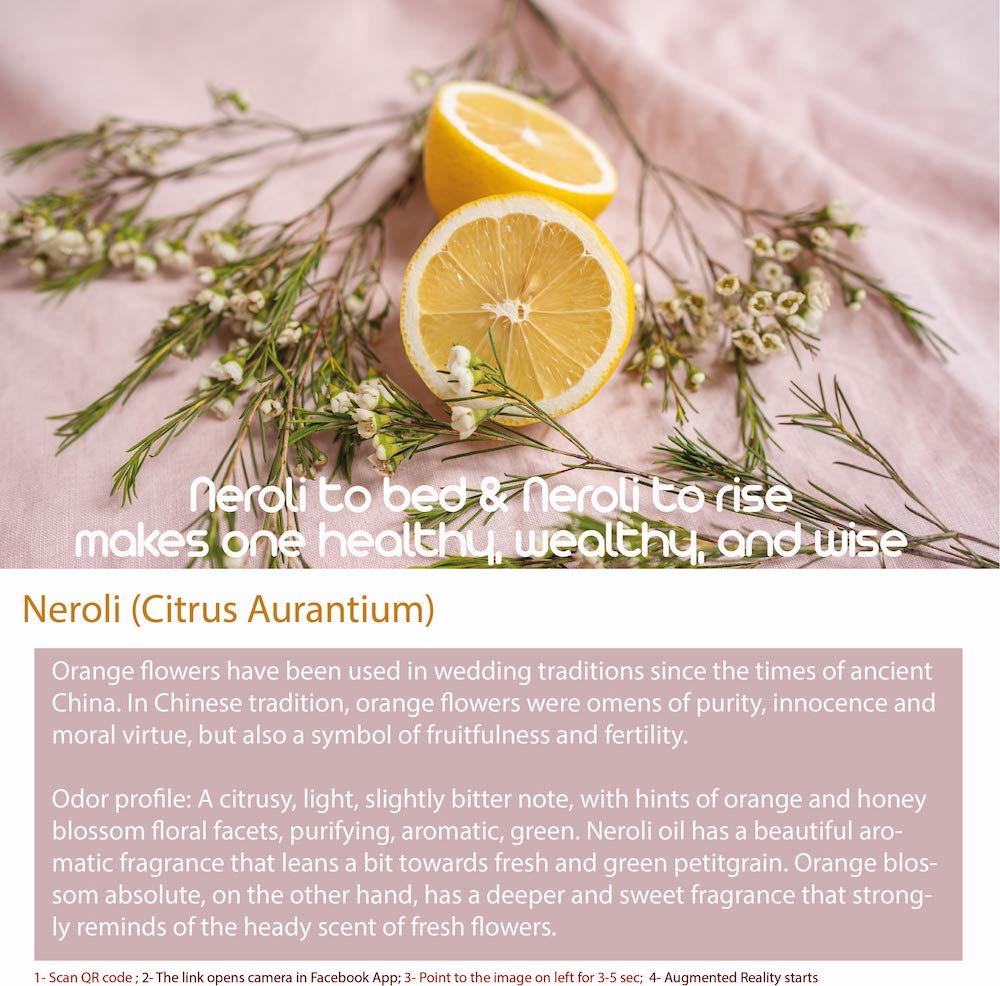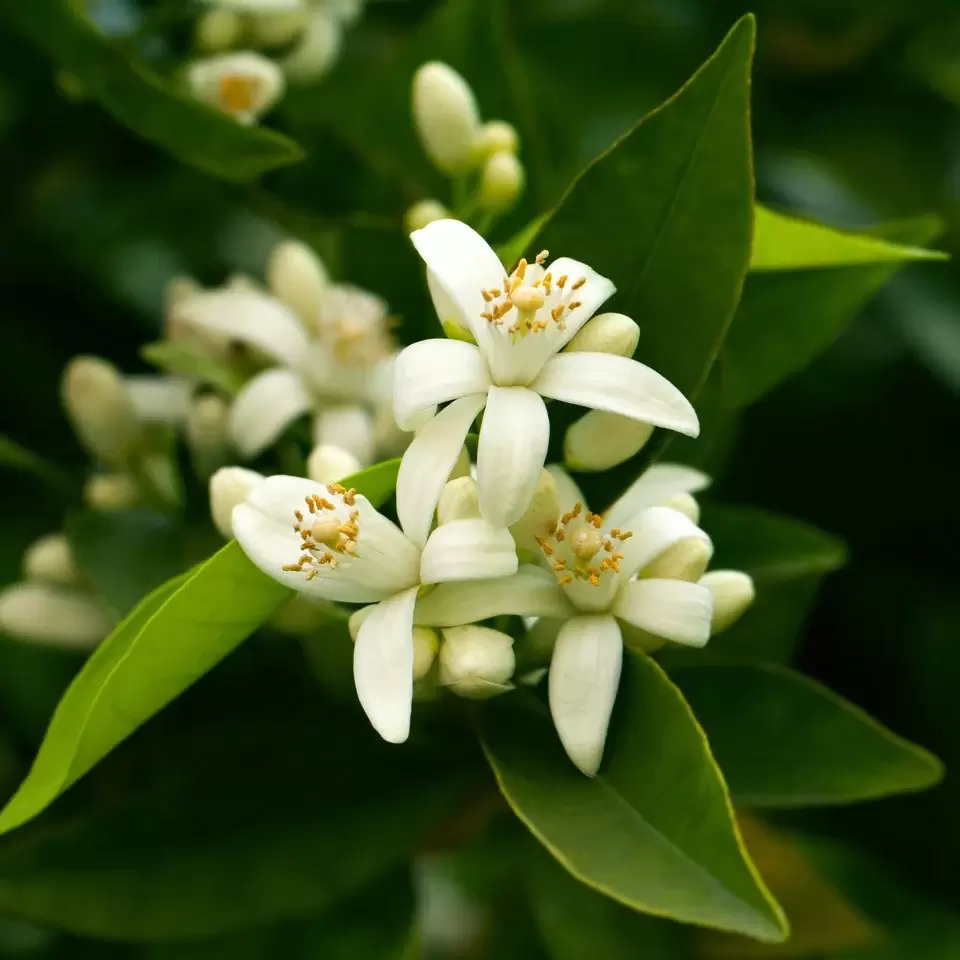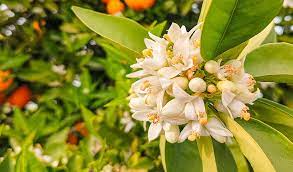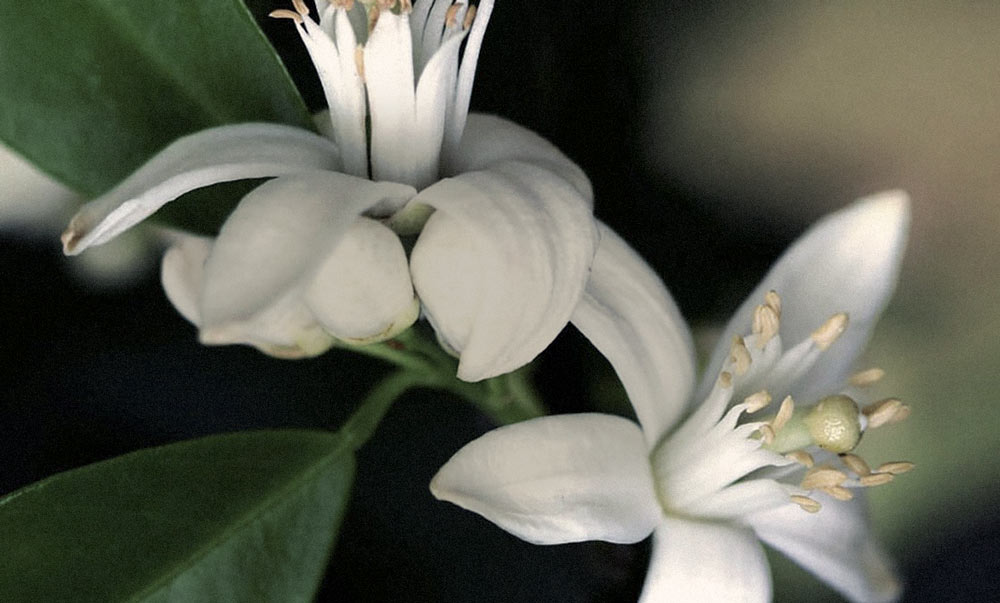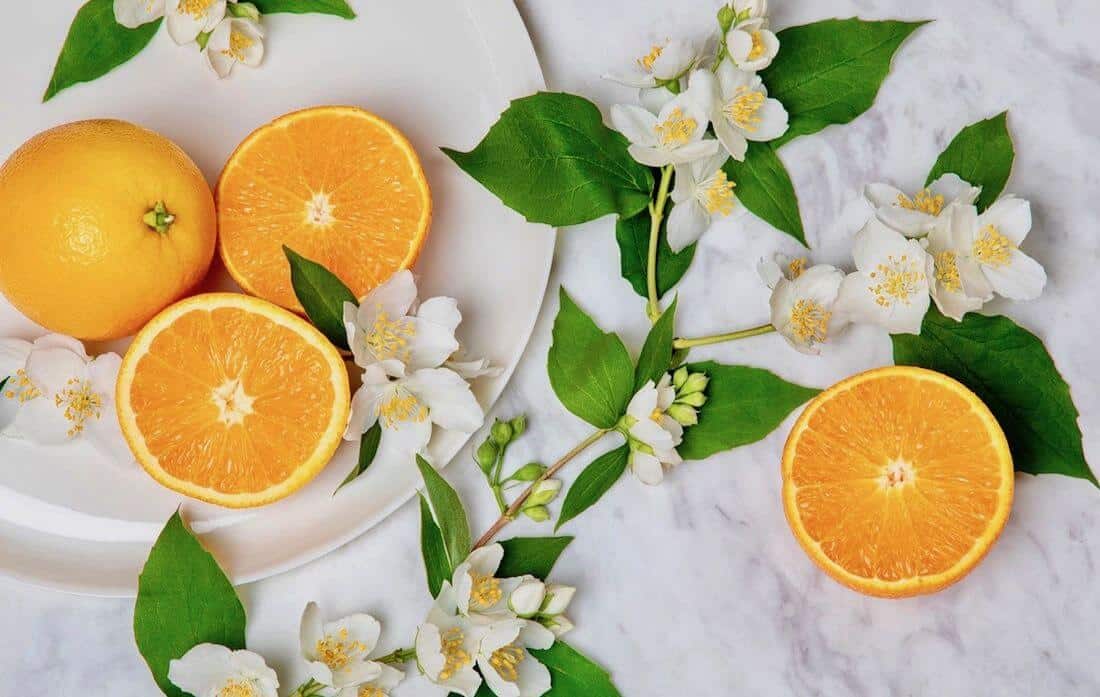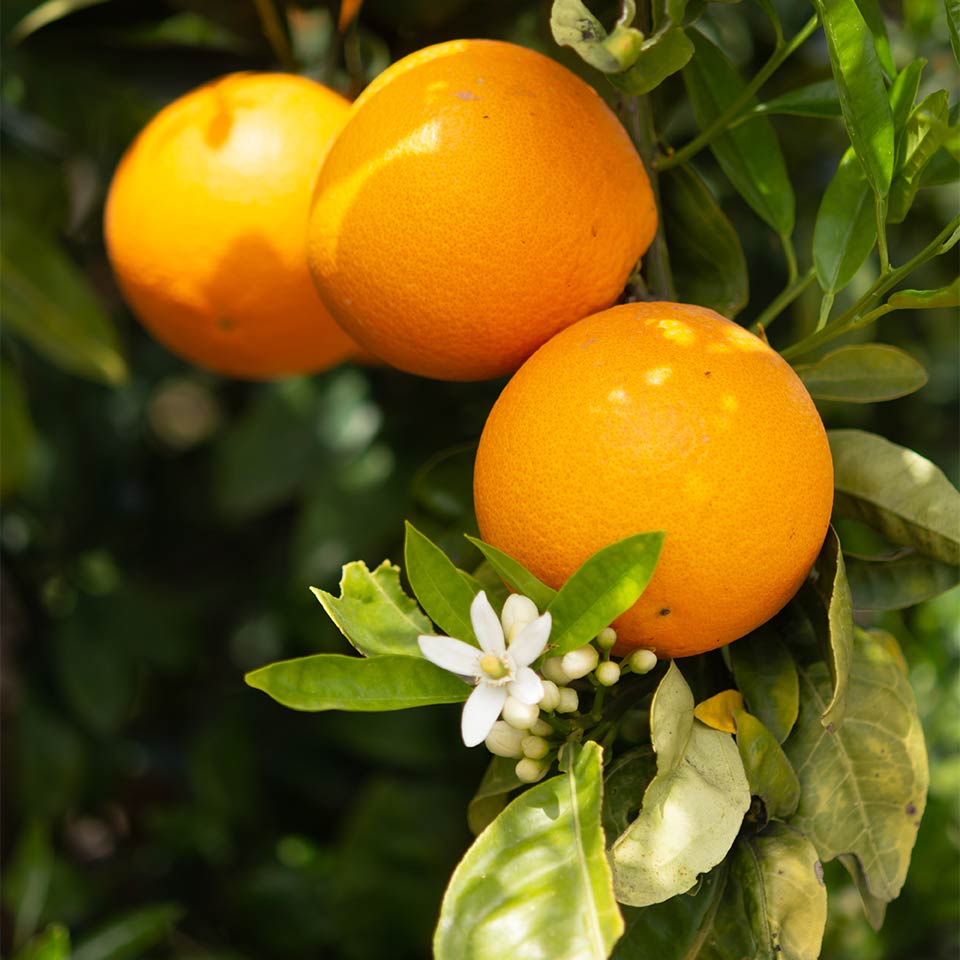Experience the Captivating Aroma of Neroli Essential Oil
Neroli: The Captivating and Fragrant Essence
Introduction: Neroli, with its captivating and fragrant essence, is a cherished and timeless fragrance that has delighted perfumers, aromatherapists, and enthusiasts for centuries. This enchanting and versatile oil, derived from the flowers of the bitter orange tree, has found its way into various aspects of human life. From its presence in perfumes and therapeutic oils to its occasional use in traditional medicine and culinary creations, neroli remains a symbol of elegance, serenity, and beauty. This essay explores the captivating world of neroli, encompassing its presence in perfumes, therapeutic oils, food, medicine, and uncovering some fascinating and fun facts about this delightful and aromatic essence.
Historical Significance and the Story of Neroli: Neroli essential oil is named after the Italian princess, Anne-Marie de la Tremoille, Countess of Nerola, who was an avid lover of the fragrance. In the 17th century, she popularized the use of bitter orange flower essence as a perfume, and it came to be known as "neroli" in her honor. The use of neroli in perfumes and as a luxurious fragrance quickly spread throughout Europe, becoming a symbol of elegance and refinement.
Perfumes and Fragrance: Neroli essential oil, obtained through steam distillation of the fragrant flowers of the bitter orange tree (Citrus aurantium), is highly prized in the world of perfumery. Its exquisite and captivating scent is often described as floral, sweet, and citrusy with a hint of bitterness. Neroli is considered a middle to top note in perfumes, and its alluring and uplifting aroma adds a touch of elegance and serenity to fragrance compositions. It is a popular choice in high-end and niche perfumes, particularly those aimed at promoting relaxation and well-being.
Therapeutic Oils and Aromatherapy: Neroli essential oil has a range of potential therapeutic properties, making it valuable in aromatherapy. Its calming and soothing aroma is believed to reduce anxiety, promote relaxation, and uplift the mood. Neroli oil is often used in aromatherapy to combat stress, nervous tension, and insomnia. Additionally, it has potential skin benefits, helping to rejuvenate and nourish the skin, making it a popular ingredient in skincare products.
Culinary Delights and Medicinal Applications: Neroli is not typically used in culinary creations or traditional medicine due to its rarity and expense. However, it is occasionally used as a flavoring agent in certain beverages, desserts, and confections. In terms of medicinal applications, neroli has been historically used in folk remedies for various purposes, such as digestive support and calming effects.
Fun and Crazy Facts:
Neroli, with its captivating and fragrant essence, remains a cherished and elegant fragrance that has fascinated humans for centuries. From its historical significance as a perfume favored by European nobility to its therapeutic properties in aromatherapy and skincare, neroli continues to be a symbol of elegance, serenity, and beauty. As we immerse ourselves in the enchanting allure of neroli, we are reminded of the power of fragrance to evoke emotions, create memories, and enhance our well-being.
Introduction: Neroli, with its captivating and fragrant essence, is a cherished and timeless fragrance that has delighted perfumers, aromatherapists, and enthusiasts for centuries. This enchanting and versatile oil, derived from the flowers of the bitter orange tree, has found its way into various aspects of human life. From its presence in perfumes and therapeutic oils to its occasional use in traditional medicine and culinary creations, neroli remains a symbol of elegance, serenity, and beauty. This essay explores the captivating world of neroli, encompassing its presence in perfumes, therapeutic oils, food, medicine, and uncovering some fascinating and fun facts about this delightful and aromatic essence.
Historical Significance and the Story of Neroli: Neroli essential oil is named after the Italian princess, Anne-Marie de la Tremoille, Countess of Nerola, who was an avid lover of the fragrance. In the 17th century, she popularized the use of bitter orange flower essence as a perfume, and it came to be known as "neroli" in her honor. The use of neroli in perfumes and as a luxurious fragrance quickly spread throughout Europe, becoming a symbol of elegance and refinement.
Perfumes and Fragrance: Neroli essential oil, obtained through steam distillation of the fragrant flowers of the bitter orange tree (Citrus aurantium), is highly prized in the world of perfumery. Its exquisite and captivating scent is often described as floral, sweet, and citrusy with a hint of bitterness. Neroli is considered a middle to top note in perfumes, and its alluring and uplifting aroma adds a touch of elegance and serenity to fragrance compositions. It is a popular choice in high-end and niche perfumes, particularly those aimed at promoting relaxation and well-being.
Therapeutic Oils and Aromatherapy: Neroli essential oil has a range of potential therapeutic properties, making it valuable in aromatherapy. Its calming and soothing aroma is believed to reduce anxiety, promote relaxation, and uplift the mood. Neroli oil is often used in aromatherapy to combat stress, nervous tension, and insomnia. Additionally, it has potential skin benefits, helping to rejuvenate and nourish the skin, making it a popular ingredient in skincare products.
Culinary Delights and Medicinal Applications: Neroli is not typically used in culinary creations or traditional medicine due to its rarity and expense. However, it is occasionally used as a flavoring agent in certain beverages, desserts, and confections. In terms of medicinal applications, neroli has been historically used in folk remedies for various purposes, such as digestive support and calming effects.
Fun and Crazy Facts:
- Versatility of Bitter Orange: The bitter orange tree (Citrus aurantium) is known for its versatility. From the flowers, we get neroli essential oil, and from the peel of its fruit, we obtain bitter orange essential oil and petitgrain essential oil.
- Rituals and Traditions: Neroli has been used in religious rituals and wedding ceremonies throughout history. In some cultures, it symbolizes purity, innocence, and new beginnings.
- Scent in Skincare: Neroli's calming and skin-nourishing properties have made it a popular ingredient in high-quality skincare products, including creams, lotions, and serums.
- Neroli in Cosmetics: Neroli water, also known as orange blossom water, is used as a toner and natural fragrance in cosmetics and beauty products.
- Symbolism in Art and Literature: Neroli has been celebrated in art and literature for its association with beauty, romance, and elegance. It often symbolizes love and devotion in various creative works.
Neroli, with its captivating and fragrant essence, remains a cherished and elegant fragrance that has fascinated humans for centuries. From its historical significance as a perfume favored by European nobility to its therapeutic properties in aromatherapy and skincare, neroli continues to be a symbol of elegance, serenity, and beauty. As we immerse ourselves in the enchanting allure of neroli, we are reminded of the power of fragrance to evoke emotions, create memories, and enhance our well-being.
To experience augmented reality, please open the Facebook-app using QR code and point to the image below
Pure Citrusy Fragrance for Aromatherapy
Neroli is an essential oil that is extracted from the bitter orange tree (Citrus aurantium). The oil is made from the flowers of the tree, and it has a sweet, floral, and citrusy aroma. The name "neroli" comes from the Princess of Nerola, Italy, who was said to have worn the oil as a perfume in the 17th century.
Neroli oil is used in perfumery to create a light, fresh, and floral scent. It is also used in aromatherapy for its calming and relaxing properties. Neroli oil is considered a middle note in perfumery and it's often used in combination with other floral notes, such as jasmine, rose and ylang-ylang as well as with citrusy notes like bergamot, lemon and mandarin. It's also used to balance and harmonize the other ingredients of a fragrance.
Neroli oil is also used in the manufacturing of various skin care and hair care products due to its revitalizing and rejuvenating properties, it's also an ingredient in many soap, lotions and creams. It's also said to have a healing effect on the skin and its helpful in treating various skin problems such as acne, eczema, and scarring.
Neroli oil is considered a precious oil, and it's relatively expensive compared to other essential oils because of the large quantity of flowers needed to produce a small amount of oil.
Neroli oil is used in perfumery to create a light, fresh, and floral scent. It is also used in aromatherapy for its calming and relaxing properties. Neroli oil is considered a middle note in perfumery and it's often used in combination with other floral notes, such as jasmine, rose and ylang-ylang as well as with citrusy notes like bergamot, lemon and mandarin. It's also used to balance and harmonize the other ingredients of a fragrance.
Neroli oil is also used in the manufacturing of various skin care and hair care products due to its revitalizing and rejuvenating properties, it's also an ingredient in many soap, lotions and creams. It's also said to have a healing effect on the skin and its helpful in treating various skin problems such as acne, eczema, and scarring.
Neroli oil is considered a precious oil, and it's relatively expensive compared to other essential oils because of the large quantity of flowers needed to produce a small amount of oil.
Discover the Aromatics Collection at Scentopia Singapore
Neroli oil has a long history of use in perfumery, dating back to the 17th century. The oil was first named after the Princess of Nerola, Italy, who was said to have worn the oil as a perfume. The oil became popular among the nobility and the upper classes, who used it as a personal fragrance and in perfumes.
In the 18th century, the use of neroli oil spread to other parts of Europe, and it became a popular ingredient in perfumes and colognes. The oil was also used in the manufacturing of soaps, lotions, and other personal care products.
During the 19th century, the use of neroli oil in perfumery continued to grow, and it became a popular ingredient in perfumes and colognes. The oil was also used in the manufacturing of soaps, lotions, and other personal care products.
Neroli oil was also used in traditional medicine for its calming and relaxing properties, as well as for its ability to improve the appearance of the skin.
In the 20th century, the use of neroli oil in perfumery continued to evolve, and it became a popular ingredient in perfumes and colognes. The oil was also used in the manufacturing of soaps, lotions, and other personal care products.
Today, neroli oil is still widely used in perfumery, and it is considered a precious oil. It's also used in aromatherapy and in skin care and hair care products due to its revitalizing and rejuvenating properties.
In the 18th century, the use of neroli oil spread to other parts of Europe, and it became a popular ingredient in perfumes and colognes. The oil was also used in the manufacturing of soaps, lotions, and other personal care products.
During the 19th century, the use of neroli oil in perfumery continued to grow, and it became a popular ingredient in perfumes and colognes. The oil was also used in the manufacturing of soaps, lotions, and other personal care products.
Neroli oil was also used in traditional medicine for its calming and relaxing properties, as well as for its ability to improve the appearance of the skin.
In the 20th century, the use of neroli oil in perfumery continued to evolve, and it became a popular ingredient in perfumes and colognes. The oil was also used in the manufacturing of soaps, lotions, and other personal care products.
Today, neroli oil is still widely used in perfumery, and it is considered a precious oil. It's also used in aromatherapy and in skin care and hair care products due to its revitalizing and rejuvenating properties.
Elevate Your Senses with Citrusy Neroli Oil
Some fun facts about neroli:
- The bitter orange tree (Citrus aurantium) from which neroli oil is extracted, is also used to make marmalade, curaçao liqueur, and orange blossom water.
- The flowers of the bitter orange tree are highly fragrant, and they are also used in traditional wedding ceremonies in the Mediterranean and Middle East regions, as well as in religious ceremonies in some cultures.
- Neroli oil is considered a "fixative" in perfumery, which means it helps to stabilize and prolong the life of other fragrances.
- Neroli oil is also said to have aphrodisiac properties, which makes it a popular ingredient in perfumes and colognes for men and women.
- Neroli oil is also used in aromatherapy to help with anxiety, stress, and insomnia, it's also said to have a calming effect on the mind and the body.
- Neroli oil is also said to be useful in skin care, it's said to help with acne, eczema, and scarring, as well as to help reduce the appearance of wrinkles and fine lines.
- Neroli oil is also considered to be a symbol of love, purity, and innocence. It is said that in ancient times, brides would wear a wreath of orange blossoms on their wedding day as a symbol of their purity and innocence.
Aromatherapy Delight: Neroli Benefits and Uses
Neroli is a scent derived from the flowers of the bitter orange tree (Citrus aurantium). It is often used in perfumes and aromatherapy and is known for its sweet, floral, and slightly bitter aroma. Neroli essential oil is extracted from the tree's blossoms through steam distillation. It has a refreshing, uplifting and calming effect and is used to help reduce anxiety, stress and depression. It's also said to be good for the skin, improving conditions such as eczema and dermatitis, and for promoting healthy hair growth.
Benefits of Neroli: A Natural Aromatic Extract
Neroli has a sweet, floral, and slightly bitter aroma. It is often described as fresh, clean and citrusy. The scent is characterized by its top notes of orange blossom and lemon, which are well balanced by a heart of floral notes such as jasmine, and a subtle hint of spice. The base notes of neroli are woody and slightly bitter, which gives it a unique and complex aroma. The overall aroma is uplifting and refreshing, making it a popular choice for perfumes, colognes, and other scented products. Some people also describe it as a hint of green or a hint of honey. Additionally, it is considered to be a unisex scent that can be enjoyed by both men and women.
Some famous perfume brands that feature neroli in their fragrances include:
Some famous perfume brands that feature neroli in their fragrances include:
- Chanel No. 5 Eau de Parfum
- Tom Ford Neroli Portofino
- Jo Malone Orange Blossom Cologne
- Dior J'adore Eau de Parfum
- Yves Saint Laurent Black Opium Eau de Parfum
- Versace Bright Crystal Eau de Toilette
- Prada Infusion d'Iris Eau de Parfum
- Bulgari Omnia Crystalline Eau de Toilette
- Hermes Eau d'Orange Verte Eau de Cologne
- Annick Goutal Petite Cherie Eau de Toilette
Join Scentopia, Sentosa's latest tourist attraction wonderful orchid scent crafting, fragrance tour, bridal shower or corporate team building which includes perfume making onsite and offsite, beach activities and more. We also serve primary school learning journey, secondary students and pupil on industrial excursions. Know more about our orchids perfume bar or therapeutic orchid scents and other wellness aromas. Conatct Perfume workshop or book a scent crafting session here.

